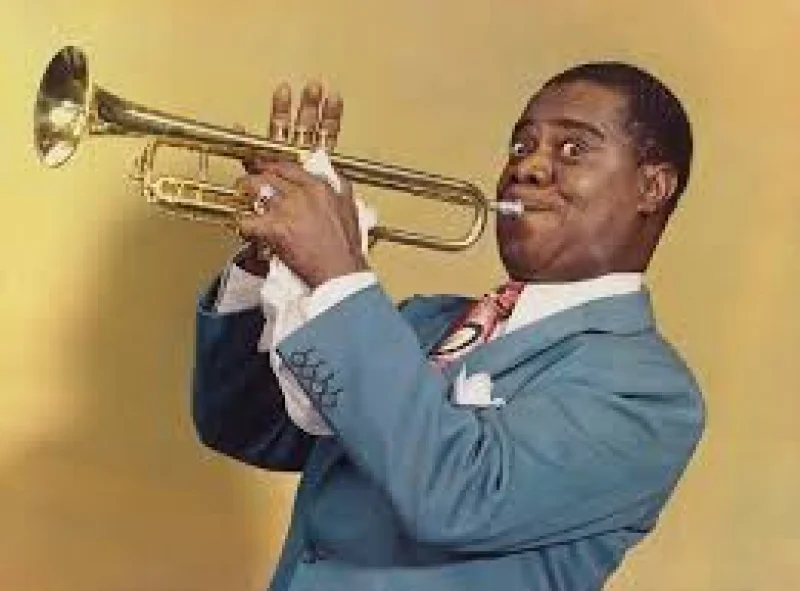Short Summary
Louis Armstrong was an iconic American jazz musician, renowned for his virtuosic trumpet playing and distinctive gravelly voice. His career spanned five decades, during which he became a pivotal figure in the development of jazz, influencing countless musicians and shaping the genre's evolution. Armstrong's improvisational skills and charismatic stage presence made him a beloved figure worldwide, earning him the nickname "Satchmo" or "Pops." His contributions to music and culture have left an indelible mark, cementing his status as one of the most influential artists of the 20th century.
Early Life & Education
Louis Armstrong was born on August 4, 1901, in New Orleans, Louisiana, a city known for its rich musical heritage. He grew up in a poor neighborhood known as "The Battlefield," where his early life was marked by hardship. Armstrong's father abandoned the family shortly after his birth, leaving his mother to raise him. He spent much of his youth in the care of his grandmother. Despite limited formal education, he found solace in music, learning to play the cornet at the New Orleans Home for Colored Waifs, a reform school where he was sent for delinquency. This experience laid the foundation for his lifelong passion for music.
Career Highlights
Louis Armstrong's career began in earnest in the 1920s when he joined King Oliver's Creole Jazz Band in Chicago, where he gained national recognition. He later joined Fletcher Henderson's Orchestra in New York City, further establishing his reputation as a leading jazz soloist. Armstrong's innovative approach to improvisation and his charismatic presence set him apart. In the 1930s and 1940s, he became a popular entertainer, appearing in films and leading his own band. His recordings, such as "What a Wonderful World" and "Hello, Dolly!" became timeless classics, showcasing his unique vocal style and cementing his legacy in the music industry.
Major Achievements
- Pioneered scat singing, a vocal improvisation style that became a hallmark of jazz music.
- Recorded the influential "Hot Five" and "Hot Seven" sessions, which showcased his groundbreaking trumpet techniques.
- Became the first African American to host a national radio show, breaking racial barriers in the entertainment industry.
- Received a Grammy Lifetime Achievement Award in 1972, recognizing his significant contributions to music.
- His rendition of "Hello, Dolly!" topped the Billboard charts, displacing The Beatles in 1964.
Famous Quotes
- "If you have to ask what jazz is, you'll never know."
- "What we play is life."
- "There is two kinds of music, the good, and the bad. I play the good kind."
Interesting Facts
- Armstrong often wore a Star of David pendant, given to him by a Jewish family who helped him during his childhood.
- He was an avid amateur radio operator, holding the call sign W6MFG.
- Armstrong's trumpet-playing style was characterized by bold, bright tones and incredible technical proficiency.
- He was posthumously awarded the Grammy Lifetime Achievement Award in 1972.
- Armstrong was known for his love of food and famously signed his letters "Red Beans and Ricely Yours."
Legacy / Influence
Louis Armstrong's influence on music and culture is profound and enduring. He transformed jazz into a soloist's art form and paved the way for future generations of musicians. His charismatic personality and innovative techniques have inspired countless artists across genres. Armstrong's ability to transcend racial barriers and bring people together through music has made him a symbol of cultural unity and artistic excellence, ensuring his legacy continues to resonate worldwide.
FAQ
Q: Why is Louis Armstrong famous?
A: Louis Armstrong is famous for his pioneering role in jazz, his exceptional trumpet playing, and his distinctive vocal style.
Q: What is Louis Armstrong's most famous song?
A: "What a Wonderful World" is one of his most famous songs, beloved worldwide for its uplifting message.
Q: How did Louis Armstrong influence jazz?
A: Armstrong influenced jazz by introducing innovative improvisational techniques and enhancing the role of the soloist.
Q: What was Louis Armstrong's nickname?
A: He was affectionately known as "Satchmo" or "Pops" by his fans and peers.











